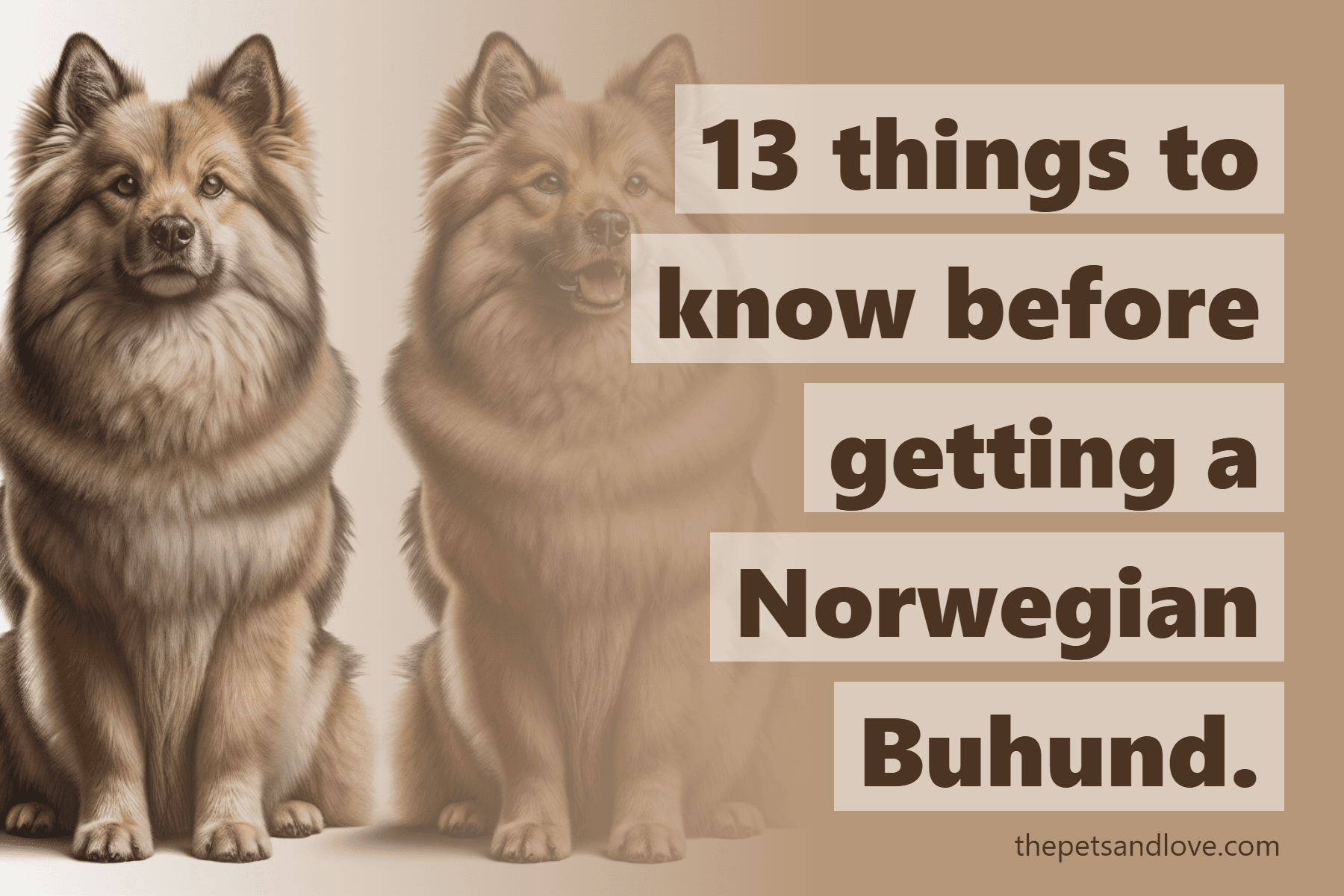13 things to know before getting a Norwegian Buhund.

Thinking about bringing home a Norwegian Buhund? These spunky, intelligent dogs are full of charm—and energy! We’ve lived with high-drive breeds ourselves, and let me tell you: the Buhund can be a total joy if you know what you’re signing up for. Here’s what we’ve learned about them, and what you should keep in mind before adding one to your family.
They’re born to work—and they won’t let you forget it.
The Norwegian Buhund has deep roots as a farm dog in Norway, going all the way back to Viking times. These dogs were bred to herd sheep, guard livestock, and even fend off predators like wolves and birds of prey. That strong working instinct is still there, which means your Buhund will need something to do.
If they get bored, they’ll find their own fun—usually by chewing, digging, or barking. So give them tasks! Agility, obedience, herding trials, or even puzzle toys can help burn off that mental and physical energy.
They’re smart—and a little cheeky.
Buhunds are clever and quick learners, but they’re also independent thinkers. You’ll need to keep training sessions short, fun, and full of rewards—especially food. We’ve found clicker training works really well with this breed.
Just don’t expect them to blindly follow commands. They like to know why they’re doing something, and if they get bored, they’ll move on. Consistency, patience, and creativity go a long way here.
Exercise isn’t optional.
These dogs thrive on movement. A quick walk around the block won’t cut it. Think long hikes, fetch sessions, or running alongside your bike. Ideally, they need two solid outings a day—plus some mental stimulation at home.
If you’re active and love being outdoors, the Buhund could be a perfect match. But if your idea of exercise is a lazy stroll to the mailbox, this isn’t the breed for you.
They’re clean, low-maintenance, and shed seasonally.
The Buhund has a thick double coat that’s surprisingly manageable. Weekly brushing is usually enough, but during spring and fall shedding seasons, you’ll want to brush daily to keep the fur tumbleweeds under control.
They don’t have a strong doggy odor and tend to stay pretty clean. Just keep up with the basics: nail trims, ear checks, and regular tooth brushing.
They're vocal—and not shy about it.
Buhunds are very expressive. They bark to alert, to talk, to play—you name it. It’s part of their watchdog heritage. While this can be helpful, it may not go over well in close living quarters like apartments.
Training can help reduce nuisance barking, but it won’t eliminate it completely. It’s part of who they are.
They’re affectionate and family-friendly.
When raised right, Buhunds are loving companions who are great with kids and other pets. They’re loyal, upbeat, and often happiest when they’re near their humans. They can handle being alone during the day if they’ve had enough stimulation, but they really enjoy being involved in family life.
We’ve seen Buhunds bond deeply with their people, and they often take their watchdog duties seriously—barking at strangers but warming up quickly once introduced.
Socialization and early training are key.
Like all smart, active breeds, early socialization makes a huge difference. Introduce your puppy to different people, dogs, sounds, and environments early on. Puppy classes, daycare, and trips to the park can help build confidence and prevent fear-based behaviors later.
Crate training is helpful, too—especially for housetraining and giving them a safe, quiet place to relax.
Health-wise, they’re generally sturdy—but do your homework.
Norwegian Buhunds are typically healthy, but like all breeds, they’re prone to some genetic conditions like hip dysplasia, eye issues, or Von Willebrand's disease. Responsible breeders test for these, so always ask for health clearances and meet the puppy’s parents if you can.
Also, watch their weight. These dogs love food and can become overweight if you’re not careful. Stick to measured meals, use treats wisely, and check with your vet for feeding advice based on your dog’s size and activity level.
They were built for the cold.
Coming from Norway, these dogs can handle chilly temperatures with ease. That thick coat keeps them warm in the winter, but it also means they can overheat in hot weather. Always provide shade, fresh water, and avoid strenuous activity during the heat of the day.
Bottom line? The Norwegian Buhund is a fantastic dog for the right person: energetic, loyal, smart, and full of life. But they’re not low-effort pets. If you’re ready to meet their needs with time, training, and plenty of exercise, you’ll have a devoted companion who brings joy—and a bit of mischief—into your life.
Thinking this might be your next dog? Start by finding a breeder who cares deeply about temperament and health. Interview them like you would a babysitter—because this pup will be part of your family for years to come!
Take the Quiz
Is a Norwegian Buhund Right for You?
The Norwegian Buhund is an energetic and intelligent herding breed known for its loyalty and agility. Discover if this spirited companion matches your lifestyle by taking our quiz! Answer all questions below to discover your compatibility score and get personalized insights.
Question #1: What is the main reason you want a dog?
Question #2: How active is your lifestyle?
Question #3: How much time can you dedicate to your dog daily?
Question #4: What best describes your home environment?
Question #5: What size dog do you prefer?
Question #6: What personality traits do you want in your dog?
Question #7: How much grooming can you handle?
Question #8: Who else lives with the dog?
Question #9: Is this your first dog?
Please answer all 9 questions to see your results
